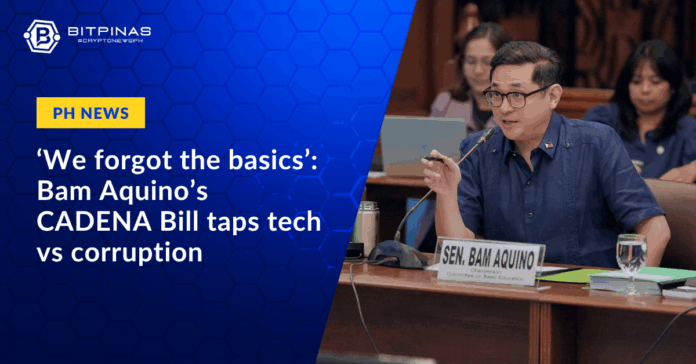Disclaimer: This article is for informational purposes only and does not constitute financial advice. BitPinas has no commercial relationship with any mentioned entity unless otherwise stated.
📬 Get the biggest crypto stories in the Philippines and Southeast Asia every week — subscribe to the BitPinas Newsletter.
Ikulong ang mga kurakot. Ibalik ang ninakaw. Baguhin ang sistema.
(English Translation: Jail the corrupt. Return what was stolen. Change the system.)
These are the shouts of the Filipinos after the controversial flood control projects scandal, according to Senator Paolo Benigno “Bam” Aquino IV, during his keynote speech at the Philippine Media and Information Literacy Conference 2025.
The lawmaker emphasized that the first two sentences have been heard before, but the third one is new. The Senator said that the CADENA Act, short for Citizens Access for Disclosure and Expenditures for National Accountability Act — the rebranded version of the Blockchain the Budget Bill, which he authored — will be part of the new system.
The Current System: Forgetting the Basics
According to Aquino, who spoke in a mix of English and Filipino during the event, a flood control project should be a basic project for the government; however, despite being the priority of the Department of Public Works and Highways (DPWH), it resulted in chaos and a massive corruption issue.
The senator cited his experience in Naga City, where he and Mayor Leni Robredo visited a public school. It rained for just 45 minutes, and yet the school went underwater, with the flood reported to be at knee-level.
Aquino then raised another national issue: the lack of classrooms. He explained that the country needs 165,000 classrooms to meet the right standards for students, but DPWH forgot to build them.
“During a Senate hearing, we asked DPWH Secretary Vince Dizon, “How many classrooms has the DPWH built for 2025?” Even he was surprised. We found out that as of ten months into the year, the DPWH has completed only 22 classrooms for 2025.”
Paolo Benigno “Bam” Aquino IV, Senator, 20th Congress of the Philippines
The senator highlighted that a classroom should be the most basic project for the DPWH because it was literally just a quadrangular room, but the government agency forgot them.
“Why am I mentioning this? Because in our country, many of our fundamentals are lacking. The government should never steal from its own people — that’s basic.”
Paolo Benigno “Bam” Aquino IV, Senator, 20th Congress of the Philippines
The New System: Fixing the Basics With Technology
Aquino then stressed that while one part of the effort should try to resolve the basics, the other part should focus on the future.
This is where he mentioned the CADENA Act. He explained to the audience of the conference, which included youth and educators, how the emerging technology can make the government more transparent, potentially resulting in less, or hopefully zero, corruption.
“In other words, every peso from our taxes—every fund we’ve worked hard for—must be disclosed to the public. This bill will mandate transparency not only for the budget, the line items, and the amendments, but also for the contracts of contractors, the bill of materials, and even the prices of cement and steel.
Anyone who bids, as well as the project’s progress reports, will also be made public.
If agencies fail to share this data with the public, they will be held liable—administratively and even criminally. Any hidden contract may make the agency head or responsible officer a co-conspirator in a fraudulent case.
Paolo Benigno “Bam” Aquino IV, Senator, 20th Congress of the Philippines
The Role of Blockchain

To secure this disclosed government data, the bill mandates adding a layer of technology — which for now is blockchain, according to Aquino — to secure the data.
He then said that this technology layer is important so the data cannot be changed or tampered with, citing jokingly the recent fire accident in the DPWH Compound, which affected three offices of the agency’s Bureau of Research and Standards: the Materials Testing Division, the Technical Services Division, and the storage room of the Standards Development Division.
“But we have an eye towards the future because we’re using the newest and best technology to help resolve our fundamental problems.”
Paolo Benigno “Bam” Aquino IV, Senator, 20th Congress of the Philippines
What is CADENA Bill?
Announced during the November 4, 2025, public hearing and joint session of the Committee on Science and Technology and the Committee on Finance, the CADENA Act is Senate Bill No. 1330, which was previously “Blockchain The Budget” or “National Budget Blockchain Act.”
Despite the change in bill name, Aquino assured that the mission remains unchanged: making every peso “trackable” and bringing transparency to the national budget.
And when turned into law, the CADENA Act aims to combat corruption through these two features:
Establish an official digital platform, which will be called “Cadena.”
- Cadena will be open-source and must integrate with existing government systems like PhilGEPS and the e-Gov app managed by the Department of Information and Communication Technology (DICT).
- According to Aquino, the data will be officially “owned by the Filipino people,” with the DICT acting as the “primary custodian.”
Establish the National Budget and Transparency Accountability Council
- The council will oversee Cadena’s implementation.
- It will be co-chaired by the DICT and the Department of Budget and Management and include three citizen representatives from CSOs (civil society organizations), the academe, and the media.
Aquino shared that he will sponsor the finalized bill on November 12, 2025. And if passed into law by Q1 2026, the first phase, which will focus on immediate disclosure of all documents on agency websites, is slated for completion within nine months.
Worth Reading:
This article is published on BitPinas: ‘We Forgot the Basics’: Bam Aquino’s CADENA Act Taps Tech to Fight Corruption
What else is happening in Crypto Philippines and beyond?




